- Home
- Neil Gaiman
American Gods Page 37
American Gods Read online
Page 37
Bilquis has spent the last week inside. Unable to stand on the sidewalk, she has curled up in her bed in the room the color of raw liver, listening to the rain pattering on the metal box of the window air conditioner and placing personals on the Internet. She has left her invitations on adultfriendfinder.com, LA-escorts.com, Classyhollywoodbabes.com, has given herself an anonymous e-mail address. She was proud of herself for negotiating the new territories, but remains nervous—she has spent a long time avoiding anything that might resemble a paper trail. She has never even taken a small ad in the back pages of the L.A. Weekly, preferring to pick out her own customers, to find by eye and smell and touch the ones who will worship her as she needs to be worshiped, the ones who will let her take them all the way . . .
And it occurs to her now, standing and shivering on the street corner (for the late February rains have left off, but the chill they brought with them remains) that she has a habit as bad as that of the smack whores and the crack whores, and this distresses her, and her lips begin to move again. If you were close enough to her ruby-red lips you would hear her say,
“I will rise now and go about the city in the streets, and in the broad ways I will seek the one I love.” She is whispering that, and she whispers, “By night on my bed I sought him whom my soul loveth. Let him kiss me with the kisses of his mouth. My beloved is mine and I am his.”
Bilquis hopes that the break in the rains will bring the johns back. Most of the year she walks the same two or three blocks on Sunset, enjoying the cool L.A. nights. Once a month she pays off an officer in the LAPD, who replaced the last guy she used to pay off, who had vanished. His name had been Jerry LeBec, and his disappearance had been a mystery to the LAPD. He had become obsessed with Bilquis, had taken to following her on foot. One afternoon she woke, startled by a noise, and opened the door to her apartment, and found Jerry LeBec in civilian clothes kneeling and swaying on the worn carpet, his head bowed, waiting for her to come out. The noise she had heard was the noise of his head, thumping against her door as he rocked back and forth on his knees.
She stroked his hair and told him to come inside, and later she put his clothes into a black plastic garbage bag and tossed them into a Dumpster behind a hotel several blocks away. His gun and his wallet she put into a grocery store bag. She poured used coffee grounds and food waste on top of them, folded the top of the bag, and dropped it into a trash can at a bus stop.
She kept no souvenirs.
The orange night sky glimmers to the west with distant lightning, somewhere out to sea, and Bilquis knows that the rain will be starting soon. She sighs. She does not want to be caught in the rain. She will return to her apartment, she decides, and take a bath, and shave her legs—it seems to her she is always shaving her legs—and sleep.
She begins to walk up a side street, walking up the hillside to where her car is parked.
Headlights come up behind her, slowing as they approach her, and she turns her face to the street and smiles. The smile freezes when she sees the car is a white stretch limo. Men in stretch limos want to fuck in stretch limos, not in the privacy of Bilquis’s shrine. Still, it might be an investment. Something for the future.
A tinted window hums down and Bilquis walks over to the limo, smiling. “Hey, honey,” she says. “You looking for something?”
“Sweet loving,” says a voice from the back of the stretch. She peers inside, as much as she can through the open window: she knows a girl who got into a stretch with five drunk football players and got hurt real bad, but there’s only one john in there that she can see, and he looks kind of on the young side. He doesn’t feel like a worshiper, but money, good money that’s passed from his hand to hers, that’s an energy in its own right—baraka, they called it, once on a time—which she can use and frankly these days, every little helps.
“How much?” he asks.
“Depends on what you want and how long you want it for,” she says. “And whether you can afford it.” She can smell something smoky drifting out of the limo window. It smells like burning wires and overheating circuit boards. The door is pushed open from inside.
“I can pay for anything I want,” says the john. She leans into the car and looks around. There’s nobody else in there, just the john, a puffy-faced kid who doesn’t even look old enough to drink. Nobody else, so she gets in.
“Rich kid, huh?” she says.
“Richer than rich,” he tells her, edging along the leather seat toward her. He moves awkwardly. She smiles at him.
“Mm. Makes me hot, honey,” she tells him. “You must be one of them dot coms I read about?”
He preens then, puffs like a bullfrog. “Yeah. Among other things. I’m a technical boy.” The car moves off.
“So,” he says. “Tell me, Bilquis, how much just to suck my cock?”
“What you call me?”
“Bilquis,” he says, again. And then he sings, in a voice not made for singing, “You are an immaterial girl living in a material world.” There is something rehearsed about his words, as if he’s practiced this exchange in front of a mirror.
She stops smiling, and her face changes, becomes wiser, sharper, harder. “What do you want?”
“I told you. Sweet loving.”
“I’ll give you whatever you want,” she says. She needs to get out of the limo. It’s moving too fast for her to throw herself from the car, she figures, but she’ll do it if she can’t talk her way out of this. Whatever’s happening here, she doesn’t like it.
“What I want. Yes.” He pauses. His tongue runs over his lips. “I want a clean world. I want to own tomorrow. I want evolution, devolution, and revolution. I want to move our kind from the fringes of the slipstream to the higher ground of the mainstream. You people are underground. That’s wrong. We need to take the spotlight and shine. Front and center. You people have been so far underground for so long you’ve lost the use of your eyes.”
“My name’s Ayesha,” she says. “I don’t know what you’re talking about. There’s another girl on that corner, her name’s Bilquis. We could go back to Sunset, you could have both of us . . .”
“Oh, Bilquis,” he says, and he sighs, theatrically. “There’s only so much belief to go around. They’re reaching the end of what they can give us. The credibility gap.” And then he sings, once again, in his tuneless nasal voice, “You are an analog girl, living in a digital world.” The limo takes a corner too fast, and he tumbles across the seat into her. The driver of the car is hidden behind tinted glass. An irrational conviction strikes her, that nobody is driving the car, that the white limo is driving through Beverly Hills like Herbie the Love Bug, under its own power.
Then the john reaches out his hand and taps on the tinted glass.
The car slows, and before it has stopped moving Bilquis has pushed open the door and she half jumps, half falls out onto the blacktop. She’s on a hillside road. To the left of her is a steep hill, to the right is a sheer drop. She starts to run down the road.
The limo sits there, unmoving.
It starts to rain, and her high heels slip and twist beneath her. She kicks them off, and runs, soaked to the skin, looking for somewhere she can get off the road. She’s scared. She has power, true, but it’s hunger-magic, cunt-magic. It has kept her alive in this land for so long, but for everything else she uses her sharp eyes and her mind, her height and her presence.
There’s a metal guardrail at knee height on her right, to stop cars from tumbling over the side of the hill, and now the rain is running down the hill road turning it into a river, and the soles of her feet have started to bleed.
The lights of L.A. are spread out in front of her, a twinkling electrical map of an imaginary kingdom, the heavens laid out right here on earth, and she knows that all she needs to be safe is to get off the road.
I am black but comely, she mouths to the night and the rain. I am the rose of Sharon, and the lily of the valleys. Stay me with flagons, comfort me with apples: for I am sick of love
.
A fork of lightning burns greenly across the night sky. She loses her footing, slides several feet, skinning her leg and elbow, and she is getting to her feet when she sees the lights of the car descending the hill toward her. It’s coming down too fast for safety and she wonders whether to throw herself to the right, where it could crush her against the hillside, or the left, where she might tumble down the gully. She runs across the road, intending to push herself up the wet earth, to climb, when the white stretch limo comes fishtailing down the slick hillside road, hell, it must be doing eighty, maybe even aquaplaning on the surface of the road, and she’s pushing her hands into a handful of weeds and earth, and she’s going to get up and away, she knows, when the wet earth crumbles and she tumbles back down onto the road.
The car hits her with an impact that crumples the grille and tosses her into the air like a glove puppet. She lands on the road behind the limo, and the impact shatters her pelvis, fractures her skull. Cold rainwater runs over her face.
She begins to curse her killer: curse him silently, as she cannot move her lips. She curses him in waking and in sleeping, in living and in death. She curses him as only someone who is half-demon on her father’s side can curse.
A car door slams. Someone approaches her. “You were an analog girl,” he sings again, tunelessly, “living in a digital world.” And then he says, “You fucking madonnas. All you fucking madonnas.” He walks away.
The car door slams.
The limo reverses, and runs back over her, slowly, for the first time. Her bones crunch beneath the wheels. Then the limo comes back down the hill toward her.
When, finally, it drives away down the hill, all it leaves behind on the road is the smeared red meat of roadkill, barely recognizable as human, and soon even that will be washed away by the rain.
INTERLUDE 2
“Hi, Samantha.”
“Mags? Is that you?”
“Who else? Leon said that Auntie Sammy called when I was in the shower.”
“We had a good talk. He’s such a sweet kid.”
“Yeah. I think I’ll keep him.”
A moment of discomfort for both of them, barely a crackle of a whisper over the telephone lines. Then, “Sammy, how’s school?”
“They’re giving us a week off. Problem with the furnaces. How are things in your neck of the North Woods?”
“Well, I’ve got a new next-door neighbor. He does coin tricks. The Lakeside News letter column currently features a blistering debate on the potential rezoning of the town land down by the old cemetery on the southeast shore of the lake and yours truly has to write a strident editorial summarizing the paper’s position on this without offending anybody or in fact giving anyone any idea what our position is.”
“Sounds like fun.”
“It’s not. Alison McGovern vanished last week—Jilly and Stan McGovern’s oldest. Nice kid. She baby-sat for Leon a few times.”
A mouth opens to say something, and it closes again, leaving whatever it was to say unsaid, and instead it says, “That’s awful.”
“Yes.”
“So . . .” and there’s nothing to follow that with that isn’t going to hurt, so she says, “Is he cute?”
“Who?”
“The neighbor.”
“His name’s Ainsel. Mike Ainsel. He’s okay. Too young for me. Big guy, looks . . . what’s the word. Begins with an M.”
“Mean? Moody? Magnificent? Married?”
A short laugh, then, “Yes, I guess he does look married. I mean, if there’s a look that married men have, he kind of has it. But the word I was thinking of was Melancholy. He looks Melancholy.”
“And Mysterious?”
“Not particularly. When he moved in he seemed kinda helpless—he didn’t even know to heat-seal the windows. These days he still looks like he doesn’t know what he’s doing here. When he’s here—he’s here, then he’s gone again. I’ve seen him out walking from time to time.”
“Maybe he’s a bank robber.”
“Uh-huh. Just what I was thinking.”
“You were not. That was my idea. Listen, Mags, how are you? Are you okay?”
“Yeah.”
“Really?”
“No.”
A long pause then. “I’m coming up to see you.”
“Sammy, no.”
“It’ll be after the weekend, before the furnaces are working and school starts again. It’ll be fun. You can make up a bed on the couch for me. And invite the mysterious neighbor over for dinner one night.”
“Sam, you’re matchmaking.”
“Who’s matchmaking? After Claudine-the-bitch-from-hell, maybe I’m ready to go back to boys for a while. I met a nice strange boy when I hitchhiked down to El Paso for Christmas.”
“Oh. Look, Sam, you’ve got to stop hitchhiking.”
“How do you think I’m going to get to Lakeside?”
“Alison McGovern was hitchhiking. Even in a town like this, it’s not safe. I’ll wire you the money. You can take the bus.”
“I’ll be fine.”
“Sammy.”
“Okay, Mags. Wire me the money if it’ll let you sleep easier.”
“You know it will.”
“Okay, bossy big sister. Give Leon a hug and tell him Auntie Sammy’s coming up and he’s not to hide his toys in her bed this time.”
“I’ll tell him. I don’t promise it’ll do any good.”
“So when should I expect you?”
“Tomorrow night. You don’t have to meet me at the bus station—I’ll ask Hinzelmann to run me over in Tessie.”
“Too late. Tessie’s in mothballs for the winter. But Hinzelmann will give you a ride anyway. He likes you. You listen to his stories.”
“Maybe you should get Hinzelmann to write your editorial for you. Let’s see. ‘On the Rezoning of the Land by the Old Cemetery. It so happens that in the winter of ought-three my grampaw shot a stag down by the old cemetery by the lake. He was out of bullets, so he used a cherry-stone from the lunch my grandmama had packed for him. Creased the skull of the stag and it shot off like a bat out of heck. Two years later he was down that way and he sees this mighty buck with a spreading cherry tree growing between its antlers. Well, he shot it, and grandmama made cherry pies enough that they were still eating them come the next fourth of July . . . ‘ “
And they both laughed, then.
INTERLUDE 3
Jacksonville, Florida. 2:00 A.M.
“The sign says help wanted.”
“We’re always hiring.”
“I can only work the night shift. Is that going to be a problem?”
“Shouldn’t be. I can get you an application to fill out. You ever worked in a gas station before?”
“No. I figure, how hard can it be?”
“Well, it ain’t rocket science, that’s for sure. You know, ma’am, you don’t mind my saying this, but you do not look well.”
“I know. It’s a medical condition. Looks worse than it is. Nothing life-threatening.”
“Okay. You leave that application with me. We are really shorthanded on the late shift right now. Round here we call it the zombie shift. You do it too long, that’s how you feel. Well now . . . is that Lama?”
“Laura.”
“Laura. Okay. Well, I hope you don’t mind dealing with weirdos. Because they come out at night.”
“I’m sure they do. I can cope.”
CHAPTER THIRTEEN
Hey, old friend.
What do you say, old friend?
Make it okay, old friend,
Give an old friendship a break.
Why so grim?
We’re going on forever.
You, me, him—
Too many lives are at stake . . .
—Stephen Sondheim, “Old Friends”
It was Saturday morning. Shadow answered the door.
Marguerite Olsen was there. She did not come in, just stood in the sunlight, looking serious. “Mister Ainsel . . .
?”
“Mike, please,” said Shadow.
“Mike, yes. Would you like to come over for dinner tonight? About sixish? It won’t be anything exciting, just spaghetti and meatballs.”
“I like spaghetti and meatballs.”
“Obviously, if you have any other plans . . .”
“I have no other plans.”
“Six o’clock.”
“Should I bring flowers?”
“If you must. But this is a social gesture. Not a romantic one.”
He showered. He went for a short walk, down to the bridge and back. The sun was up, a tarnished quarter in the sky, and he was sweating in his coat by the time he got home. He drove the 4-Runner down to Dave’s Finest Food and bought a bottle of wine. It was a twenty-dollar bottle, which seemed to Shadow like some kind of guarantee of quality. He didn’t know wines, so he bought a Californian cabernet, because Shadow had once seen a bumper sticker, back when he was younger and people still had bumper stickers on their cars, which said LIFE IS A CABERNET and it had made him laugh.
He bought a plant in a pot as a gift. Green leaves, no flowers. Nothing remotely romantic about that.
He bought a carton of milk, which he would never drink, and a selection of fruit, which he would never eat.
Then he drove over to Mabel’s and bought a single lunchtime pasty. Mabel’s face lit up when she saw him. “Did Hinzelmann catch up with you?”
“I didn’t know he was looking for me.”
“Yup. Wants to take you ice fishing. And Chad Mulligan wanted to know if I’d seen you around. His cousin’s here from out of state. His second cousin, what we used to call kissing cousins. Such a sweetheart. You’ll love her,” and she dropped the pasty into a brown paper bag, twisted the top over to keep the pasty warm.
Shadow drove the long way home, eating one-handed, the pastry crumbs tumbling onto his jeans and onto the floor of the 4-Runner. He passed the library on the south shore of the lake. It was a black-and-white town in the ice and the snow. Spring seemed unimaginably far away: the klunker would always sit on the ice, with the ice-fishing shelters and the pickup trucks and the snowmobile tracks.

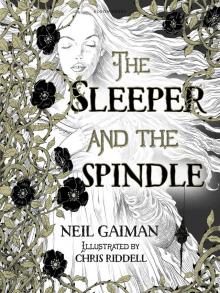 The Sleeper and the Spindle
The Sleeper and the Spindle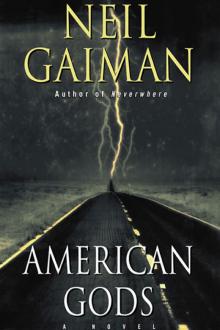 American Gods
American Gods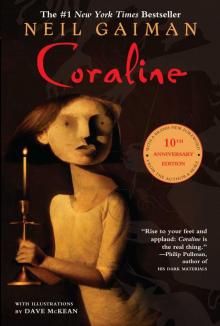 Coraline
Coraline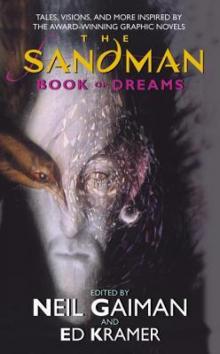 The Sandman: Book of Dreams
The Sandman: Book of Dreams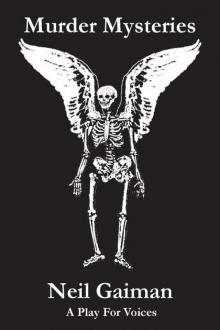 Murder Mysteries
Murder Mysteries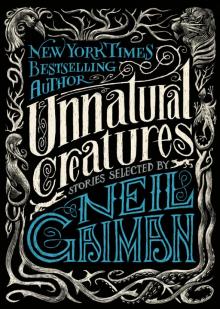 Unnatural Creatures
Unnatural Creatures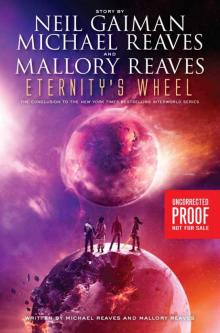 Eternity's Wheel
Eternity's Wheel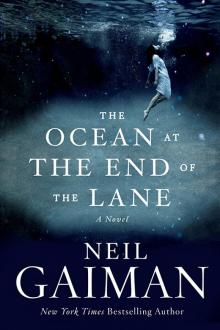 The Ocean at the End of the Lane
The Ocean at the End of the Lane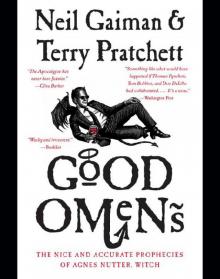 Good Omens
Good Omens Stardust
Stardust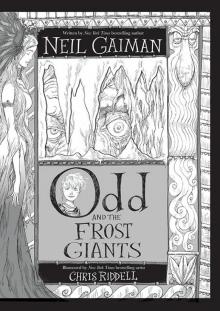 Odd and the Frost Giants
Odd and the Frost Giants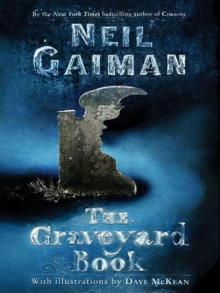 The Graveyard Book
The Graveyard Book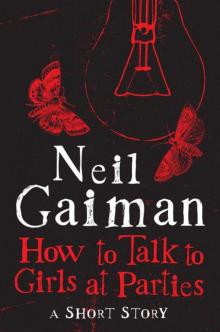 How to Talk to Girls at Parties
How to Talk to Girls at Parties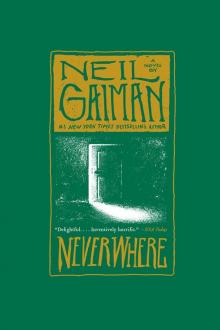 Neverwhere
Neverwhere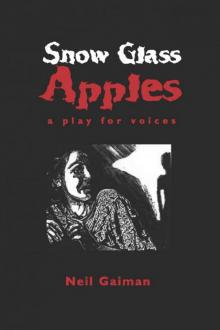 Snow, Glass, Apples
Snow, Glass, Apples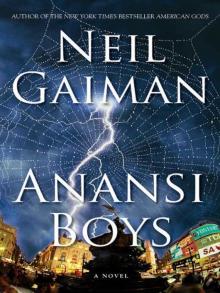 Anansi Boys
Anansi Boys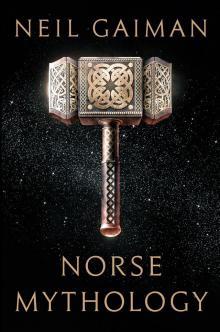 Norse Mythology
Norse Mythology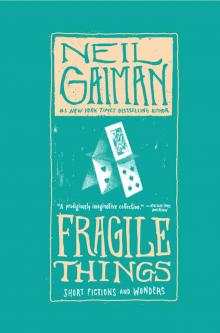 Fragile Things: Short Fictions and Wonders
Fragile Things: Short Fictions and Wonders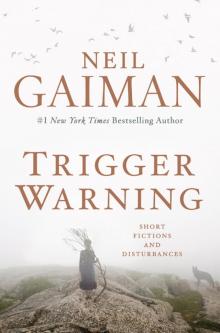 Trigger Warning: Short Fictions and Disturbances
Trigger Warning: Short Fictions and Disturbances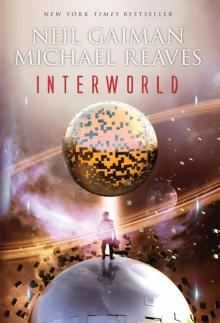 InterWorld
InterWorld The Monarch of the Glen
The Monarch of the Glen The Neil Gaiman Reader
The Neil Gaiman Reader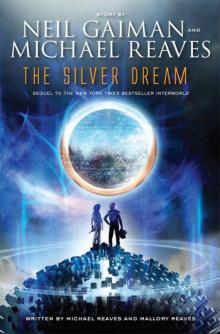 The Silver Dream
The Silver Dream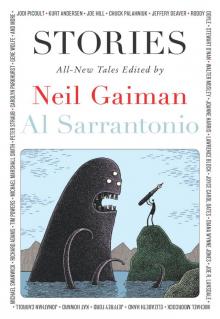 Stories
Stories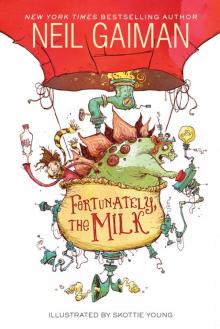 Fortunately, the Milk
Fortunately, the Milk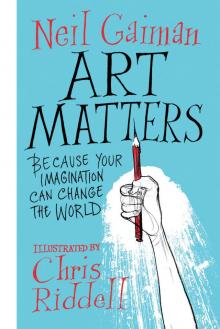 Art Matters
Art Matters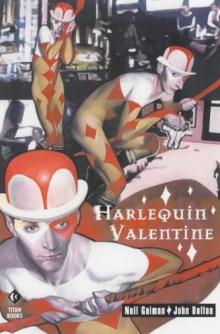 Harlequin Valentine
Harlequin Valentine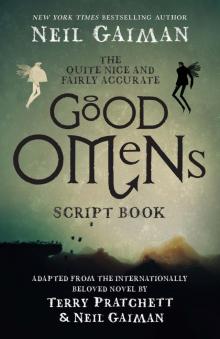 The Quite Nice and Fairly Accurate Good Omens Script Book
The Quite Nice and Fairly Accurate Good Omens Script Book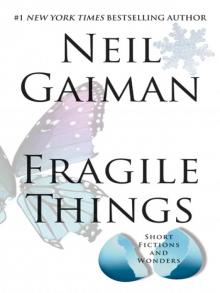 Fragile Things
Fragile Things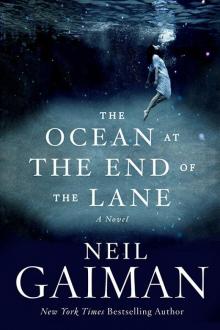 The Ocean at the End of the Lane: A Novel
The Ocean at the End of the Lane: A Novel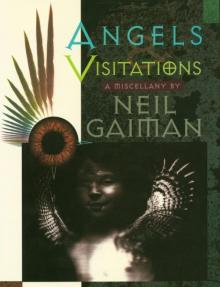 Angels and Visitations
Angels and Visitations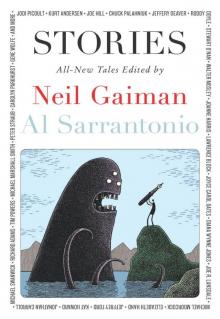 Stories: All-New Tales ngss-1
Stories: All-New Tales ngss-1 Don't Panic
Don't Panic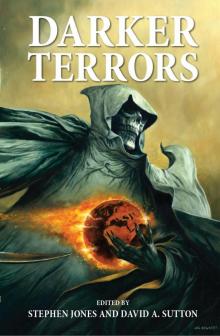 Darker Terrors
Darker Terrors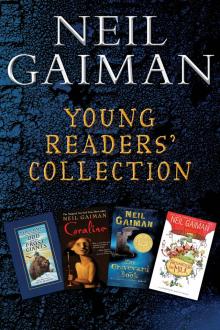 Neil Gaiman Young Readers' Collection
Neil Gaiman Young Readers' Collection A Study In Emerald
A Study In Emerald The Silver Dream: An InterWorld Novel
The Silver Dream: An InterWorld Novel Feeders and Eaters
Feeders and Eaters Psychos
Psychos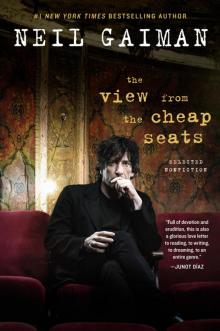 The View from the Cheap Seats
The View from the Cheap Seats Trigger Warning
Trigger Warning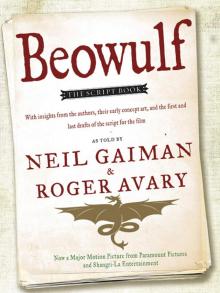 Beowulf
Beowulf Nessun Dove
Nessun Dove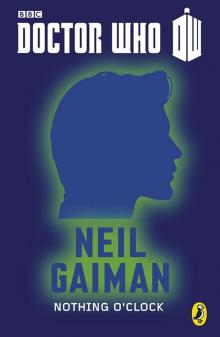 Doctor Who: Nothing O'Clock: Eleventh Doctor: 50th Anniversary
Doctor Who: Nothing O'Clock: Eleventh Doctor: 50th Anniversary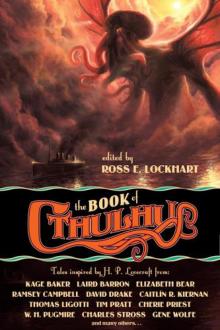 The Book of Cthulhu
The Book of Cthulhu